Exam 5: Price Controls and Quotas- Meddling With Markets
Exam 1: First Principles233 Questions
Exam 2: Economic Models- Trade-Offs and Trade313 Questions
Exam 3: Supply and Demand290 Questions
Exam 4: Consumer and Producer Surplus224 Questions
Exam 5: Price Controls and Quotas- Meddling With Markets201 Questions
Exam 6: Elasticity98 Questions
Exam 7: Taxes298 Questions
Exam 9: The Rational Consumer44 Questions
Exam 8: International Trade268 Questions
Exam 10: Decision Making by Individuals and Firms116 Questions
Exam 11: Perfect Competition and the Supply Curve355 Questions
Exam 12: Monopoly348 Questions
Exam 13: Oligopoly97 Questions
Exam 14: Monopolistic Competition and Product Differentiation124 Questions
Exam 15: Externalities140 Questions
Exam 16: Public Goods and Common Resources75 Questions
Exam 17: The Economics of the Welfare State91 Questions
Exam 18: Factor Markets and the Distribution of Income314 Questions
Exam 19: Uncertainty, Risk, and Private Information197 Questions
Exam 20: Macroeconomics- the Big Picture168 Questions
Exam 21: Gdp and the Consumer Price Index204 Questions
Exam 22: Unemployment and Inflation351 Questions
Exam 23: Long-Run Economic Growth313 Questions
Exam 24: Savings, Investment Spending398 Questions
Exam 25: Fiscal Policy376 Questions
Exam 26: Money, Banking, and the Federal Reserve System464 Questions
Exam 27: Monetary Policy359 Questions
Exam 28: Inflation, Disinflation, and Deflation240 Questions
Exam 29: Crises and Consequences214 Questions
Exam 30: Macroeconomics- Events and Ideas320 Questions
Exam 31: Open-Economy Macroeconomics466 Questions
Exam 32: Graphs in Economics64 Questions
Exam 33: Toward a Fuller Understanding36 Questions
Exam 34: Consumer Preferences and Consumer Choice62 Questions
Exam 35: Indifference Curve Analysis of Labor Supply41 Questions
Select questions type
Suppose that a binding price floor is in place in a particular market. If the market is deregulated and the price floor is removed:
(Multiple Choice)
5.0/5  (41)
(41)
Use the following to answer questions
Figure: The Market for Economics Textbooks 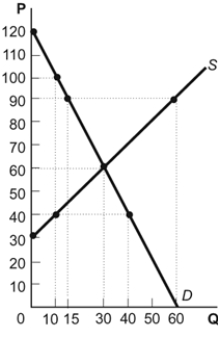 -(Figure: The Market for Economics Textbooks) Look at the figure The Market for Economics Textbooks. Suppose the government believes textbooks are too expensive and it wants to make sure textbooks are affordable to more students. This type of price control is called a price _____, and one possible binding price control would be _____.
-(Figure: The Market for Economics Textbooks) Look at the figure The Market for Economics Textbooks. Suppose the government believes textbooks are too expensive and it wants to make sure textbooks are affordable to more students. This type of price control is called a price _____, and one possible binding price control would be _____.
(Multiple Choice)
4.7/5  (44)
(44)
The government might impose a price floor if _____ can make a strong moral or political argument for _____ prices.
(Multiple Choice)
4.8/5  (35)
(35)
Use the following to answer questions 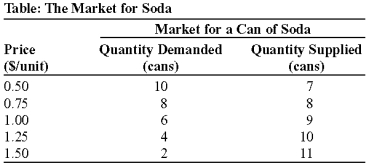 -(Table: The Market for Soda) Look at the table The Market for Soda. If the government imposes a price ceiling of $0.50 per can of soda, there will be:
-(Table: The Market for Soda) Look at the table The Market for Soda. If the government imposes a price ceiling of $0.50 per can of soda, there will be:
(Multiple Choice)
4.7/5  (33)
(33)
The quota rent is the result of a supply price that is above the demand price.
(True/False)
4.7/5  (32)
(32)
Although they cost more than $200,000 when they were issued in the 1930s, the New York taxicab medallions are relatively inexpensive today, selling for around $3,000.
(True/False)
4.9/5  (30)
(30)
The quota rent for a New York taxicab owner is equal to the market price of the license that allows him to drive the cab.
(True/False)
4.9/5  (35)
(35)
Suppose the government of the oil-rich country Saudi Arabia sets gasoline prices at $0.25 per gallon when the market price is $1.50. The Saudi government's actions will:
(Multiple Choice)
4.8/5  (40)
(40)
Use the following to answer questions
Figure: Market I 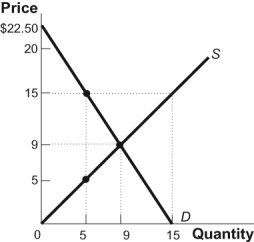 -(Figure: Market I) Look at the figure Market I. A surplus of the good will result if the price is:
-(Figure: Market I) Look at the figure Market I. A surplus of the good will result if the price is:
(Multiple Choice)
4.9/5  (38)
(38)
Use the following to answer questions  -(Table: The Market for Soda) Look at the table The Market for Soda. If the government imposes a price ceiling of $0.50 per can of soda, the quantity of soda demanded will be:
-(Table: The Market for Soda) Look at the table The Market for Soda. If the government imposes a price ceiling of $0.50 per can of soda, the quantity of soda demanded will be:
(Multiple Choice)
4.8/5  (36)
(36)
Use the following to answer question 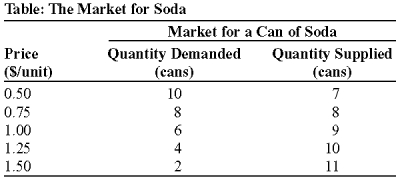 -(Table: The Market for Soda) Look at the table The Market for Soda. If the government imposes a price floor of $1 per can of soda, there will be:
-(Table: The Market for Soda) Look at the table The Market for Soda. If the government imposes a price floor of $1 per can of soda, there will be:
(Multiple Choice)
4.9/5  (30)
(30)
When the government imposes a quota on sales of a good or service, it usually licenses the right to sell a given quantity of the good. The market price of the license is equal to:
(Multiple Choice)
4.8/5  (34)
(34)
Rapidly increasing health costs have been a major political concern since at least 1992. Suppose the government sets the maximum price for a normal doctor visit at $20 to control rising health costs but the current market price is $40. What will happen?
(Multiple Choice)
4.8/5  (38)
(38)
Use the following to answer question : 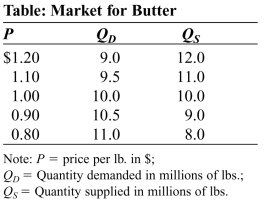 -(Table: Market for Butter) Look at the table Market for Butter. If the government imposes a price ceiling of $0.90 per pound of butter, the quantity of butter actually purchased will be:
-(Table: Market for Butter) Look at the table Market for Butter. If the government imposes a price ceiling of $0.90 per pound of butter, the quantity of butter actually purchased will be:
(Multiple Choice)
4.8/5  (31)
(31)
Suppose the United States removes the sugar quotas and the market price of sugar drops. Since sugar is an input in candy, in the candy bar market, we would expect consumer surplus to:
(Multiple Choice)
4.9/5  (35)
(35)
Showing 61 - 80 of 201
Filters
- Essay(0)
- Multiple Choice(0)
- Short Answer(0)
- True False(0)
- Matching(0)